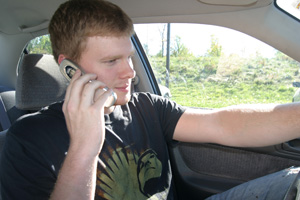The number of tickets issued for cell phone use in moving vehicles on the Ithaca College campus has increased this fall.

Between Jan. 1 and June 30, Public Safety issued 17 tickets for cell phone violations. But in just a 6-week period between Aug. 1 and Sept. 19, there were 20 tickets issued for cell phone violations.
In late August, the No Tolerance Week for cell phone traffic violations contributed to a sharp rise in the number of tickets issued for cell phone use, Investigator Tom Dunn said.
When senior Rick McGrath was driving back to his apartment on Aug. 31 after an ensemble audition, he was talking on his cell phone. McGrath, a Massachusetts native, was telling a friend about his audition when a police officer in an unmarked cruiser pulled him over for using his cell phone.
“He got out and asked me if I knew why I was being pulled over,” McGrath said. “I had no idea, I was like, I’m going 10 miles an hour.”
McGrath said the ticket was unnecessary.
“It was a college back road, you know,” he said. “There was no chance of anything going wrong — it wasn’t like I was on the freeway or something,”
New York state passed a vehicle and traffic law in December 2001 that made talking on a cell phone while operating a motor vehicle
illegal. Including New York, 17 states and Washington, D.C., enforce laws against cell phone use while driving.
According to New York’s law, the maximum fine for talking on a cell phone while driving is $100. Traffic violation tickets issued on campus are processed in the Town of Ithaca court.
Dan Gutkoski ’07 received a seatbelt violation ticket while on campus several months ago and another cell phone ticket off campus on 96B near Cayuga Medical Center. Though he said he was ticketed fairly, he researched the law and said Public Safety officers should not write Town of Ithaca tickets for on-campus violations since the law states drivers may not use cell phones on public roads, and the college roads are private.
“I would say they need to follow the letter of the law,” Gutkoski said. “I mean, if the law is written and it says that you’re only in violation of this law when you’re operating … on a public highway, then I think officers need to abide by that public highway statute.”
Gutkoski believes Public Safety should distinguish public roads from private roads.
“If the town of Ithaca maps … call the campus roads … private roads, they’re not public highways,” he said.
Dunn said college roads are readily accessible to the public, so students can receive Town of Ithaca traffic tickets for talking on their cell phones.
“All the roads on campus, students should know, will be treated like town roads,” Dunn said.
Town Justice Jim Salk said private college roads are subject to the state’s vehicle and traffic law because they are open to the public.
“The Vehicle and Traffic Law applies to all of what are usually regarded as public roads, but also private roads that are, generally speaking, open to the public,” Salk said.
Dunn said any violation of New York state law is also a violation of the student conduct code.
Gutkoski said cell phone tickets will affect students’ insurance costs and driving records.
“In my case, a cell phone ticket would actually jack up my insurance about 150 bucks a year,” he said.
Dunn said the number of offenses has generally remained consistent with the exception of No Tolerance Week. He said the numbers are difficult to track because the college population changes every year.
McGrath expressed the concern that students from out of state may not be aware of the cell phone law.
“I didn’t know the New York State law about cell phones,” McGrath said.
Both McGrath and Gutkoski said the tickets are a means to extract unnecessary revenue from students.
“We pay enough money as college students,” he said. “I mean, let’s have our cops follow the letter of the law and not nickel and dime us here.”







